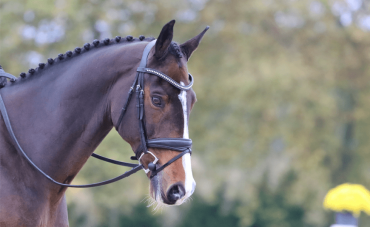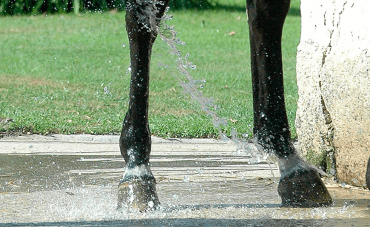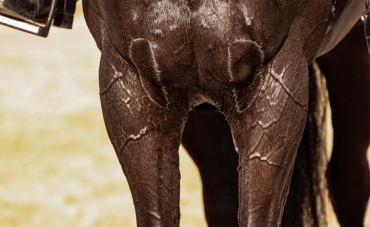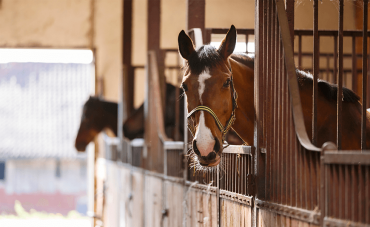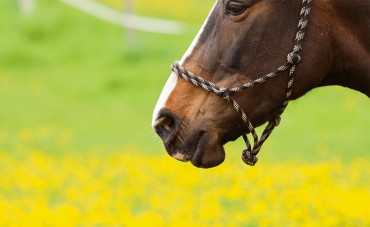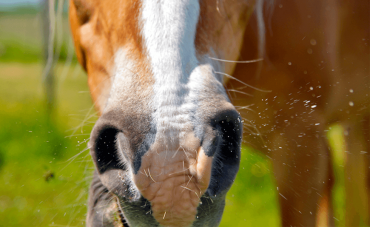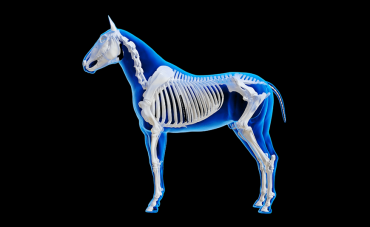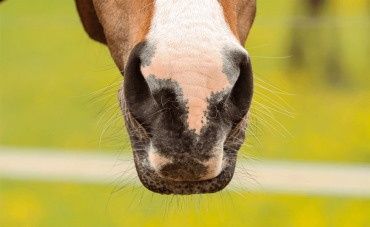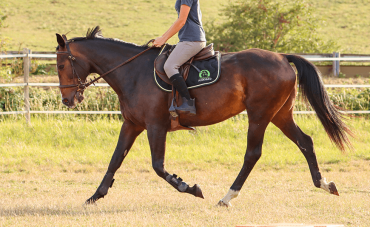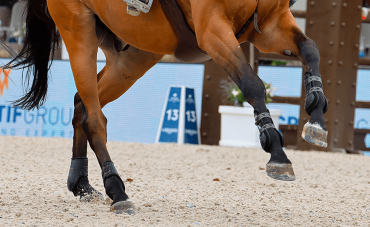"Acute diarrhoea" is not a disease but a symptom. Digestive transit is considerably accelerated and the horse expels very soft stools (like cow pats) or wholly liquid often very foul-smelling stools, no longer resembling droppings. As the term "acute" would suggest, the diarrhoea comes on suddenly and, above all, develops very rapidly.
What is it?
Cause
There are many causes of diarrhoea in horses. Acute diarrhoea is often caused by the development of particularly aggressive bacteria in the digestive tract. Infection usually occurs through the oral route, for example after drinking water contaminated by excrement (droppings, cow pats etc.). The introduction of certain parasites into the intestine, such as small strongyles, may also cause acute diarrhoea, as may other factors modifying the intestinal flora, such as stress, illness, transportation and medical treatments.
Systemic Effects
The horse's digestive tract is a hollow, tube-shaped organ, populated by many different microbes from the various bacterial families: the "intestinal flora". These different families help digest food. They usually live together in harmonious balance, by inhibiting the growth of the most dangerous bacteria. However, dangerous bacteria may manage to develop when this balance is disturbed, for example by a change of feed, medical treatment, stress or parasites. In the most serious cases, they release toxins that pass into the bloodstream, leading to severe poisoning in the horse ("endotoxemia"), which can be fatal.
Aggressive bacteria, viruses and parasites all cause extensive irritation in the intestine. This weakens the wall of the digestive tract, which becomes permeable, allowing the water that hydrates the inside of the body to leak in. When released in large quantities, this water dilutes the droppings, resulting in diarrhoea.
Additional Information
There are no particularly distinctive signs of acute diarrhoea in horses: the stools are soft (pasty to very liquid), and the animal's hindquarters are often soiled (anus, tail and rump). If the diarrhoea is very severe, water loss will lead to dehydration, visible as a lack of elasticity in the skin folds, increased supraorbital depression and sclerosis of the mouth.
Acute diarrhoea is often accompanied by moderate or more severe abdominal pain (spasms leading to colic).
Tests
Standard Tests
The vet will first examine the appearance and quantity of the stools expelled. He or she will then carry out a general examination in order to assess the horse's condition. In particular, the vet will assess the extent of the dehydration and seek to identify any signs of endotoxemia (red gums, signs of laminitis etc.). Depending on the severity of the condition, he or she may finish off the consultation with a blood test, which will provide essential information on the most appropriate treatment.
Possible further tests
In the case of acute diarrhoea, it may be useful to test the droppings to identify the cause:
Microscopic examination is used to identify the presence of any parasite eggs
Stool sample cultures can reveal the presence of dangerous bacteria (such as salmonella).
However, while positive results provide information on the origin of the problem, negative results do not rule out the suspected cause.
Treatment
To treat a horse with acute diarrhoea, the vet will first seek to re-establish the horse's natural balance.
Primary Treatment Guidelines
To treat a horse with acute diarrhoea, the vet will first seek to re-establish the horse's natural balance:
-
Rehydration by infusion, to make up for water and electrolyte loss
-
Medicinal products for the treatment and prevention of endotoxemia, if necessary.
-
Administration of analgesics (antispasmodics, appropriate anti-inflammatory agents, sedatives or morphine derivatives) to relieve abdominal pain.
He or she will then seek to treat the cause in an appropriate manner (vermifuges or other medicinal products, as relevant). If the horse still has an appetite, it is best to let it eat: give it highly digestible food, such as very high quality hay.
Nutritional Solutions
There are dietary supplements available to help maintain the balance of the intestinal flora. Audevard Laboratoires offers a unique combination of probiotics (live yeasts) and prebiotics: BO Yeas Act Ultra, designed to stabilise your horse's intestinal flora and help it better absorb the minerals contained in its feed. Ask your vet for advice.
General Health and Safety Measures
Preventing horses from drinking contaminated water is an excellent way to minimise the risk of diarrhoea. To do this, we strongly recommend:
- Cleaning around water sources in pastures and removing any excrement (droppings, cow pats etc.)
- Ensuring that drinking troughs are mounted high enough in the boxes so horses cannot defecate in them.
- It is also advisable to worm regularly for small strongyles.

